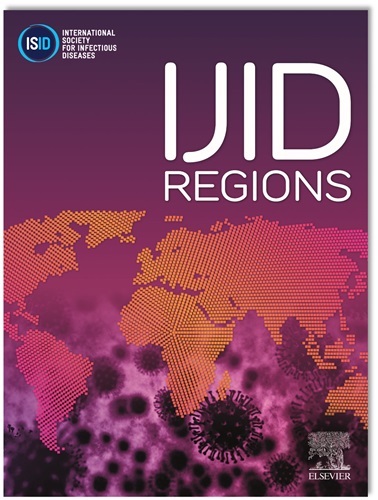Association between FTO polymorphism and COVID-19 mortality among older adults: A population-based cohort study
IF 4.8
2区 医学
Q1 INFECTIOUS DISEASES
引用次数: 0
Abstract
Objectives
COVID-19 caused a global pandemic with millions of deaths. Fat mass and obesity-associated gene (FTO) (alias m6A RNA demethylase) and its functional rs17817449 polymorphism are candidates to influence COVID-19-associated mortality since methylation status of viral nucleic acids is an important factor influencing viral viability.
Methods
We tested a population-based cohort of 5233 subjects (aged 63-87 years in 2020) where 70 persons died from COVID-19 and 394 from other causes during the pandemic period.
Results
The frequency of GG homozygotes was higher among those who died from COVID-19 (34%) than among survivors (19%) or deaths from other causes (20%), P <0.005. After multiple adjustments, GG homozygotes had a higher risk of death from COVID-19 with odds ratio = 2.01 (95% confidence interval; 1.19-3.41, P <0.01) compared with carriers of at least one T allele. The FTO polymorphism was not associated with mortality from other causes.
Conclusions
Our results suggest that FTO variability is a significant predictor of COVID-19-associated mortality in Caucasians.
老年人 FTO 多态性与 COVID-19 死亡率之间的关系:一项基于人群的队列研究。
目的:m6A RNA去甲基化酶(FTO)及其功能性rs17817449多态性可能会影响与COVID-19相关的死亡率,因为病毒核酸的甲基化状态是影响病毒生存能力的重要因素:我们对一个由 5180 名受试者(2020 年年龄为 63-87 岁)组成的人群队列进行了测试,在大流行期间,有 70 人死于 COVID-19,341 人死于其他原因:死于 COVID-19 的人群(34%)中的 GG 同源基因频率高于幸存者(19%)或死于其他原因的人群(20%),P < 0.005。经多重调整后,与至少一个T等位基因携带者相比,GG同源基因携带者死于COVID-19的风险更高,OR = 2.01 (95% CI; 1.19 - 3.41, p < 0.01)。FTO多态性与其他原因导致的死亡率无关:我们的研究结果表明,FTO变异是白种人COVID-19相关死亡率的重要预测因素。
本文章由计算机程序翻译,如有差异,请以英文原文为准。
求助全文
约1分钟内获得全文
求助全文
来源期刊
CiteScore
18.90
自引率
2.40%
发文量
1020
审稿时长
30 days
期刊介绍:
International Journal of Infectious Diseases (IJID)
Publisher: International Society for Infectious Diseases
Publication Frequency: Monthly
Type: Peer-reviewed, Open Access
Scope:
Publishes original clinical and laboratory-based research.
Reports clinical trials, reviews, and some case reports.
Focuses on epidemiology, clinical diagnosis, treatment, and control of infectious diseases.
Emphasizes diseases common in under-resourced countries.

 求助内容:
求助内容: 应助结果提醒方式:
应助结果提醒方式:


